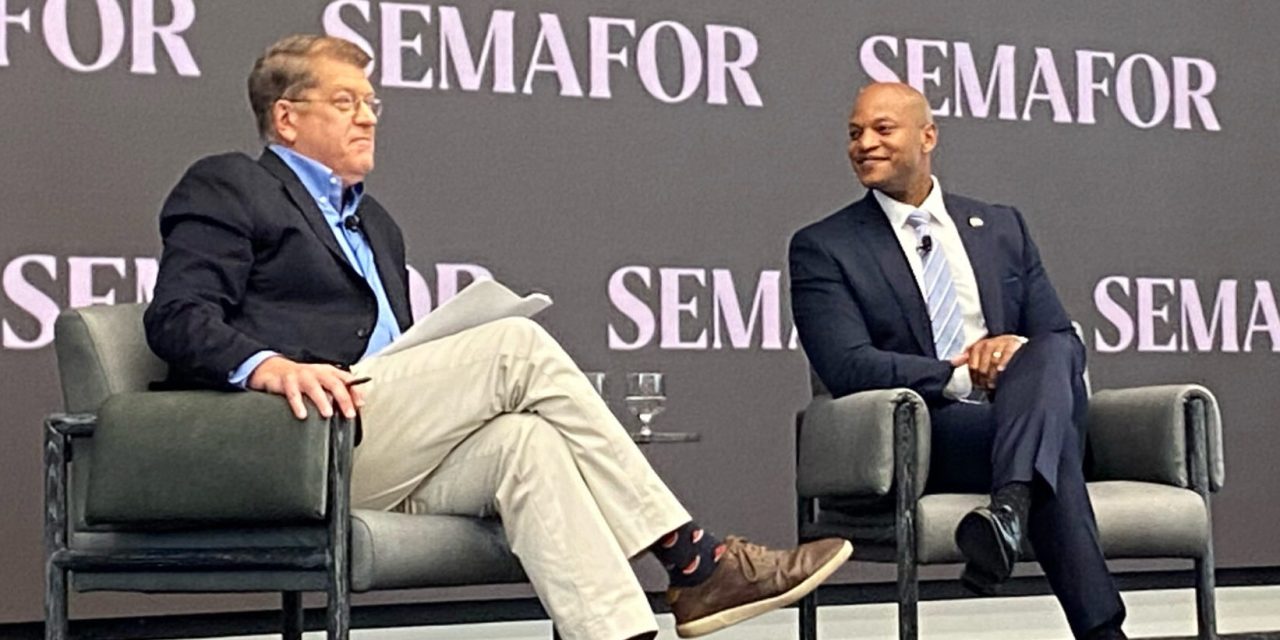By KIERSTEN HACKER
Capital News Service
WASHINGTON — Gov. Wes Moore fended off questions Tuesday on whether he’ll run in the 2024 Democratic presidential primary during an interview with global news organization Semafor, saying he had no interest in higher office and turning the subject to his nontraditional political background.
“I think it’s really important for people to remember that I am probably the most improbable governor in this country,” Moore said in answer to the first question from Semafor Cofounder and Editor-at-large Steve Clemons. “I’m a person who has never come from a political lineage.”
Moore, an author, nonprofit executive, and former Army officer, had not held political office before winning the governor’s election in 2022.
Moore turned his focus to Maryland, discussing plans to revive the state’s economy through targeted investments in its assets and better serve constituents with a data-driven approach to policy changes.
Moore often defines Maryland as “asset-rich and strategy-poor,” and cites the contrast presented by the state’s high concentration of prominent institutions of higher education, military facilities, and government agencies, such as the National Security Agency, with its sluggish economic growth rate of .2% in the past 4 years. The current economic strategy of spreading funding across numerous projects “doesn’t make sense,” he said, explaining he’ll use a more focused approach.
In June, Moore established the Maryland Economic Council, charging it with creating economic recommendations by the next legislative session in January. After the General Assembly passed numerous measures to affect systemic budgetary changes during the last session, a report from the Department of Legislative Services predicted a $418 million structural deficit for fiscal year 2025.
Moore said his administration will use data to drive policy decisions, especially when looking to minimize socioeconomic disparities, and he used environmental injustice in Baltimore as an example.
“You can’t understand what these disparities look like if we aren’t able to fully appreciate the measure of intentionality that very much existed in the creation of that and the lack of intentionality when it comes to how we’re going to address it.”
The administration must consider the root causes of poverty, investing in transit, the public education system, and programs to combat the teacher shortage, Moore said, to jumpstart economic growth.
Creating new opportunities for young people to succeed in different areas will help fight juvenile crime and keep violence out of communities, Moore said. Using data and technology in innovative ways can also help ensure that solutions to crime are predictive rather than reactive.
Increasing public safety is his top priority, Moore said, highlighting the need for “appropriate intensity, absolute integrity, and full accountability” in the policing system as well as a need for crisis intervention teams to shift the response of mental health calls away from police officers. Over $100 million was invested directly in behavioral health, Moore said.
Moore noted that police officers respond to all situations, and many times they are met with circumstances they cannot fix. He called for change, saying that public safety is in part a matter of creating a better livelihood for people.
Moore said his administration invested $122 million in local law enforcement, $17.5 million of which went to Baltimore City, where the police department has been under a federal agreement to make reforms since 2016. Moore also invested in intelligence sharing through the Maryland Coordination and Analysis Center and organized crime units.
In Baltimore, other reform means combating gun trafficking, filling the police shortage with well-trained officers, and developing more intentional solutions, said Moore, who places special importance on these issues as a Baltimore native.
“I love my state, all 24 jurisdictions. But I’m a Baltimorean,” Moore said. “That’s who I am. Can’t understand me if you don’t understand Baltimore.”




Recent Comments